Obs'COP 24, what can we learn from this international climate survey?
Climate change continues to be a priority, behind purchasing power. But the sense of concern is dropping, despite the increased number of climate disasters.
Because they feel that they are already doing their fair share, people seem less and less willing to alter their lifestyle. Moreover, climate policies are generating tension, or even a rejection in the case of those that are financially restrictive.
A key international player in the energy sector, committed to achieving carbon neutrality by 2050, EDF presents the findings of a large-scale opinion study conducted for the 6th consecutive year by Ipsos in 30 countries across all five continents, covering two-thirds of the world’s population and including the biggest CO₂ emitters. Every year, EDF produces an international report on opinions, knowledge, expectations and commitment levels with regard to climate change, to support reflection on the subject and contribute to the constructive search for future solutions.
Climate change has an important place among the topics of concern worldwide (2nd place) and in France (4th).
However, the level of concern it generates has dropped back in the past three years on a global scale (40% “very concerned”, -3 points). In France, the drop is very tangible: falling from 35% to 29% over this period.
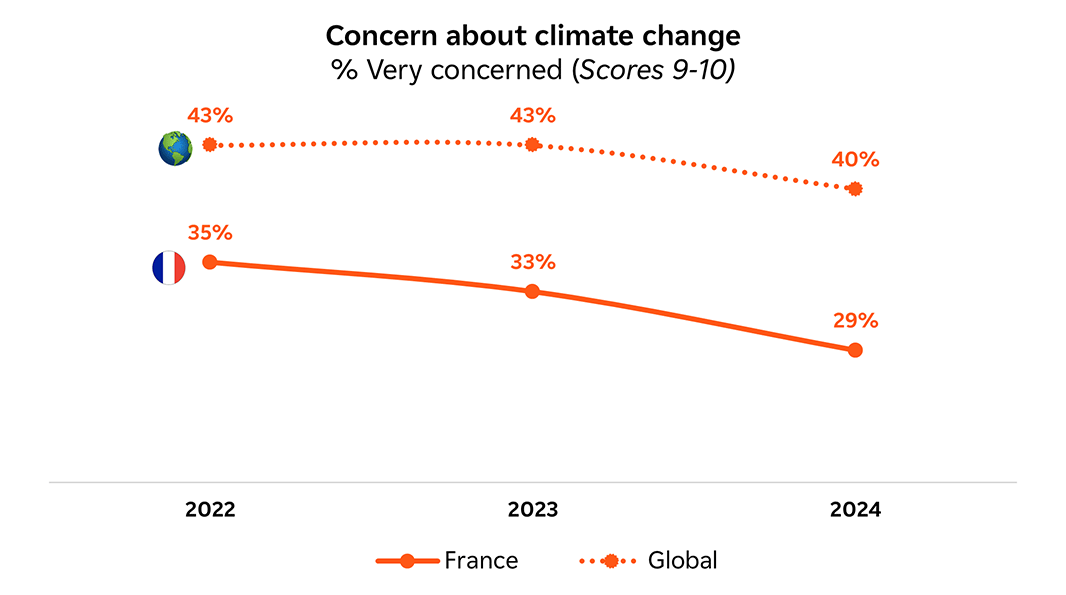
Concern about climate change
% Very concerned (Scores 9-10)
France:
- 2022: 35%
- 2023: 33%
- 2024: 29%
Global:
- 2022: 43%
- 2023: 43%
- 2024: 40%
This is a surprising result given that the signs of climate change have been accelerating, but it may be an indication that people are gradually becoming accustomed to this risk or are relativizing it.
Given the geopolitical tension along Europe’s borders since 2022, and more recently in the Middle East: armed conflicts are the second biggest concern for Europeans (50%), after the cost of living (57%).
Despite a drop in tension on prices in 2024, but with economic prospects worsening in Europe and Asia, people are more concerned about supporting economic growth, to the detriment of the environment.
In fact, when faced with the dilemma of whether to prioritize the environment or growth and jobs, a relative majority of respondents in our global survey admittedly continue to prioritize the environment, but that choice is declining (46%, -7 points in 6 years) in favor of giving priority to economic growth (38%, +4 points in 6 years). France is no exception to the rule: +10 points in favor of growth (36%), -7 points for the environment (43%).
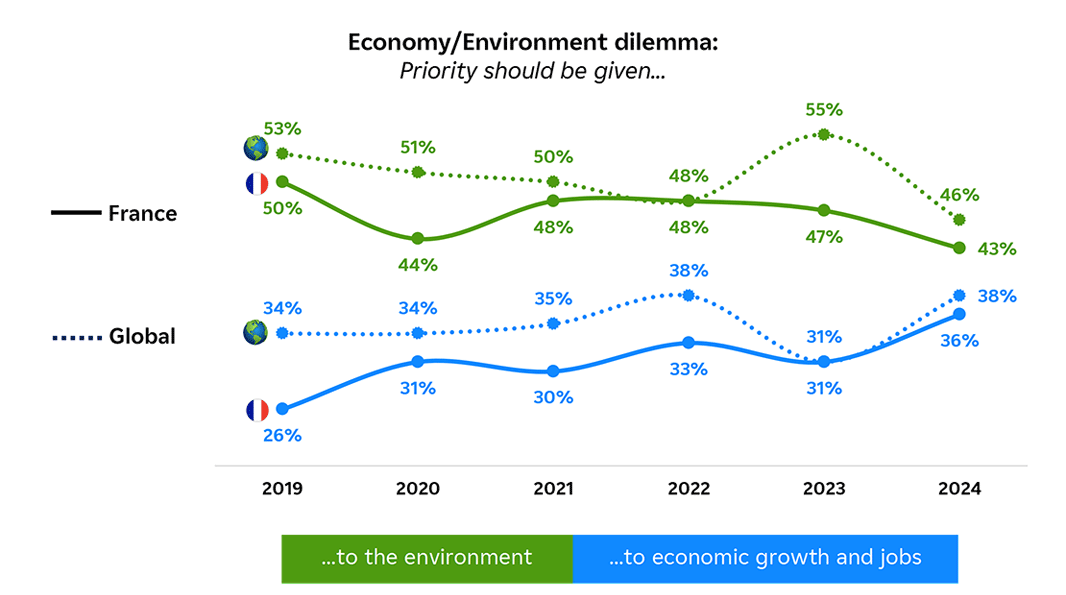
Transcript
Economy/Environment dilemma
Priority should be given…
…to the environment:
France:
- 2019: 50%
- 2020: 44%
- 2021: 48%
- 2022: 48%
- 2023: 47%
- 2024: 43%
Global:
- 2019: 53%
- 2020: 51%
- 2021: 50%
- 2022: 48%
- 2023: 55%
- 2024: 46%
…to economic growth and jobs:
France:
- 2019: 26%
- 2020: 31%
- 2021: 30%
- 2022: 33%
- 2023: 31%
- 2024: 36%
Global :
- 2019: 34%
- 2020: 34%
- 2021: 35%
- 2022: 38%
- 2023: 31%
- 2024: 38%
One third of the French people are still “climate skeptics” (33%) in other words they continue to dispute the existence of climate change (10%) or doubt that human activity is the main cause (23%). On a global scale, the results are more concerning with a tendency toward a regular increase in the level of skepticism: +7 points in 6 years.
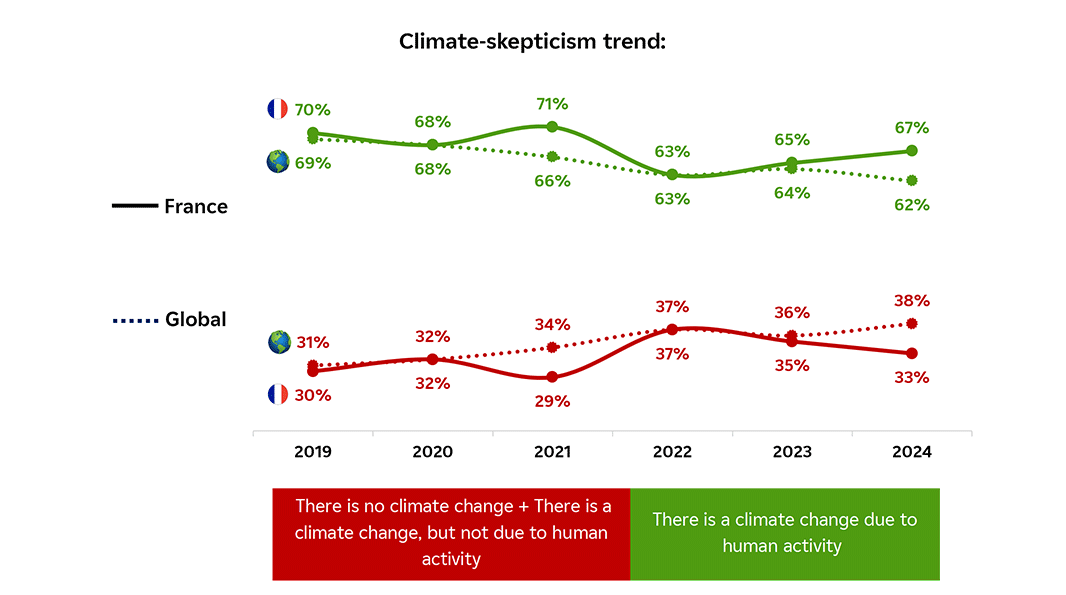
Transcript
Climate-skepticism trend
There is no climate change + There is a climate change, but not due to human activity:
France:
- 2019: 30%
- 2020: 32%
- 2021: 29%
- 2022: 37%
- 2023: 35%
- 2024: 33%
Global:
- 2019: 31%
- 2020: 32%
- 2021: 34%
- 2022: 37%
- 2023: 36%
- 2024: 38%
There is a climate change due to human activity:
France:
- 2019: 70%
- 2020: 68%
- 2021: 71%
- 2022: 63%
- 2023 : 65%
- 2024: 67%
Global:
- 2019: 69%
- 2020: 68%
- 2021: 66%
- 2022: 63%
- 2023: 64%
- 2024: 62%
Note that the French are generally less sensitive to any “climate fake news” - that might be circulating notably on social media - than the rest of the world. For example, only 20% of French people (cf. 31% for the global average) agree with the claim that “a 2-3-degree increase in the average temperature would have no serious consequences on our lives.”
One exception however concerns the carbon footprint of electric vehicles: 71% of the French population think that electric cars are just as harmful for the climate as gas-powered vehicles (cf. 50% of the world population).
The French are not alone in disputing the ecological advantage of EVs: the argument also has a lot of supporters among the Czechs (67%), Belgians (66%), Poles (62%) and Germans (60%).
On a global scale, 70% of the public expect their government to be the key player taking action in favor of the climate. Next, but quite a long way behind, come consumers themselves (41%), then the corporate world (35%).
The French also primarily point to the government as the legitimate player (69%), but private corporations come just behind (58%), ahead of consumers (51%). France therefore stands out through a greater focus on corporate environmental responsibility.
When respondents are asked to name the players that are really taking action, the French seem to take a tougher view: apart from consumers – and even their actions are only acknowledged by 44% – neither the government, nor companies, nor the local authorities manage to convince more than 38%.
An illustration of this dissatisfaction: when it comes to preparing France for the consequences of climate change, fewer than one third of the population (31%) feel that adaptation measures have been implemented by the government or local authorities.
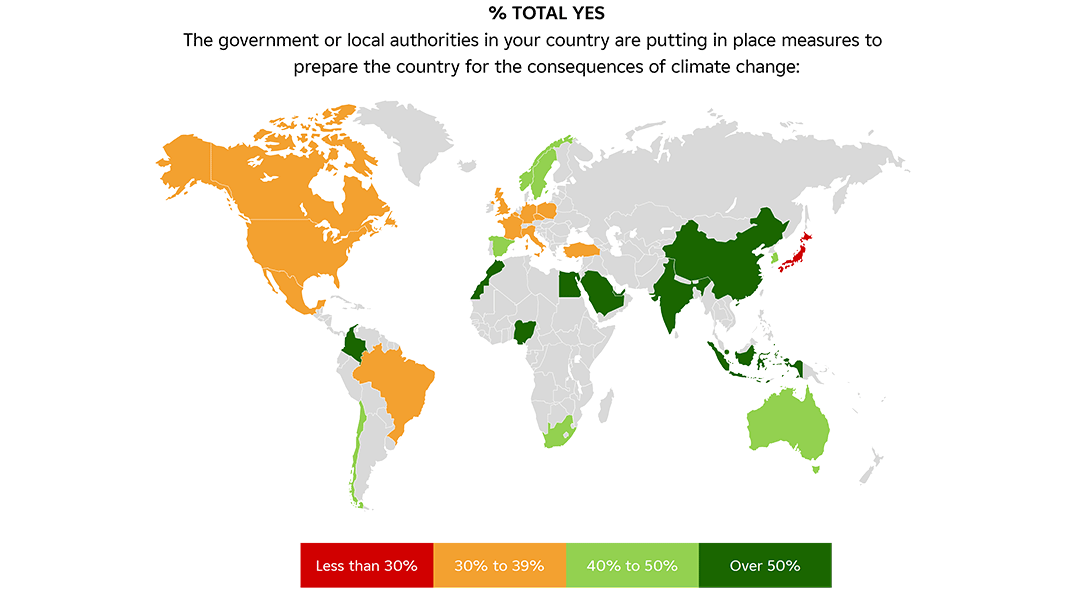
Transcript
The government or local authorities in your country are putting in place measures to prepare the country for the consequences of climate change
% TOTAL YES
- Group 1 – Dark red: Less than 30%
- Group 2 - Yellow: 30% to 39%
- Group 3 – Light green: 40% to 50%
- Group 4 – Dark green: Over 50%
- India: 75%
- Singapore: 75%
- United Arab Emirates: 74%
- China: 72%
- Indonesia: 61%
- Morocco: 58%
- Saudi Arabia: 58%
- Colombia: 54%
- Nigeria: 54%
- Egypt: 52%
- Norway: 46%
- Chile: 44%
- South Africa: 44%
- Australia: 43%
- Sweden: 43%
- South Korea: 40%
- Spain: 40%
- Mexico: 39%
- United Kingdom: 38%
- United States: 37%
- Belgium: 36%
- Canada: 35%
- Germany: 35%
- Poland: 34%
- Brazil: 33%
- Italy: 33%
- France: 31%
- Turkey: 31%
- Czech Republic: 30%
- Japan: 25%
This result lags well behind the average for other countries in the world (45%), but is close to the European average (36%), whereas one out of five French people (22%) believe that they will be forced to move in the next 10 years as a result of climate change (15% in Europe).
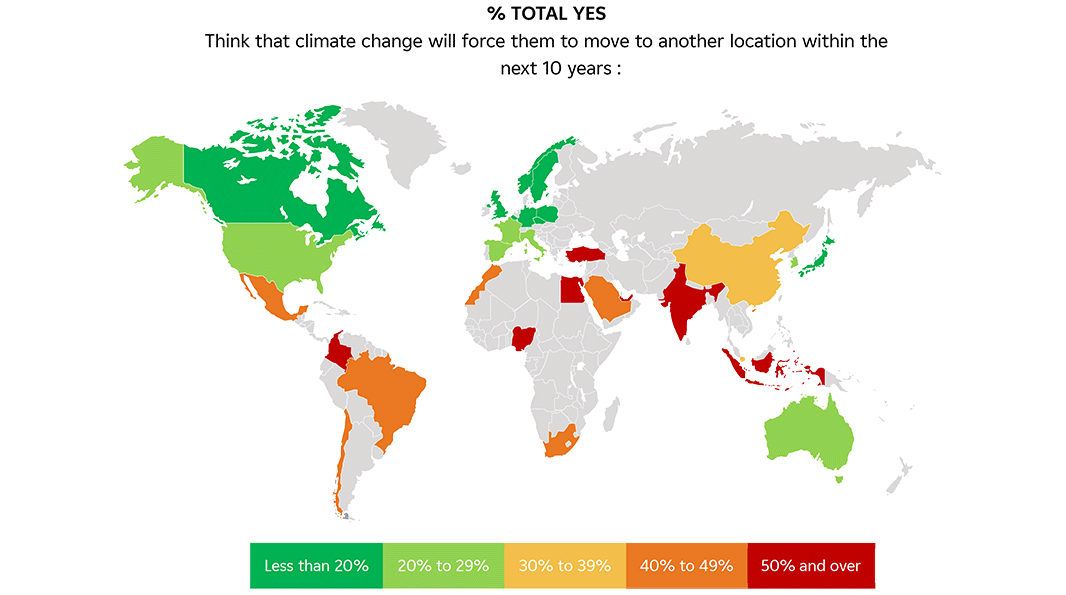
Transcript
Think that climate change will force them to move to another location within the next 10 years
% TOTAL YES
- Group 1 – Dark green: Less than 20%
- Group 2 – Light green: 20% to 29%
- Group 3 – Yellow: 30% to 39%
- Group 4 – Orange: 40% to 49%
- Group 5 – Dark red: 50% and over
- India: 61%
- Indonesia: 59%
- Egypt: 57%
- Nigeria: 56%
- United Arab Emirates: 55%
- Colombia: 51%
- Turkey: 51%
- Chile: 43%
- Morocco: 43%
- Saudi Arabia: 43%
- Mexico: 42%
- Brazil: 40%
- South Africa: 40%
- China: 36%
- Singapore: 30%
- South Korea: 27%
- Spain: 25%
- United States: 24%
- France: 22%
- Italy: 22%
- Australia: 20%
- United Kingdom: 18%
- Canada: 16%
- Sweden: 16%
- Belgium: 15%
- Japan: 15%
- Czech Republic: 9%
- Germany: 9%
- Poland: 9%
- Norway: 8%
32% of the world’s inhabitants think that they will be forced to move in the next 10 years because of climate change. That fear is very evident in the countries of the South and there is also considerable fear in some Northern countries like France.
Because they feel that they are already doing their fair share, people seem less and less willing to change and adapt their lifestyle (45%, -8 points in 6 years). The alternative, in other words relying on scientific and technological progress, does not yet have majority support (34%), since 21% choose neither of these two solutions. However, this reliance on technology has progressed in the past 6 years (+5 points) and is already supported by a majority in China in particular (46%).
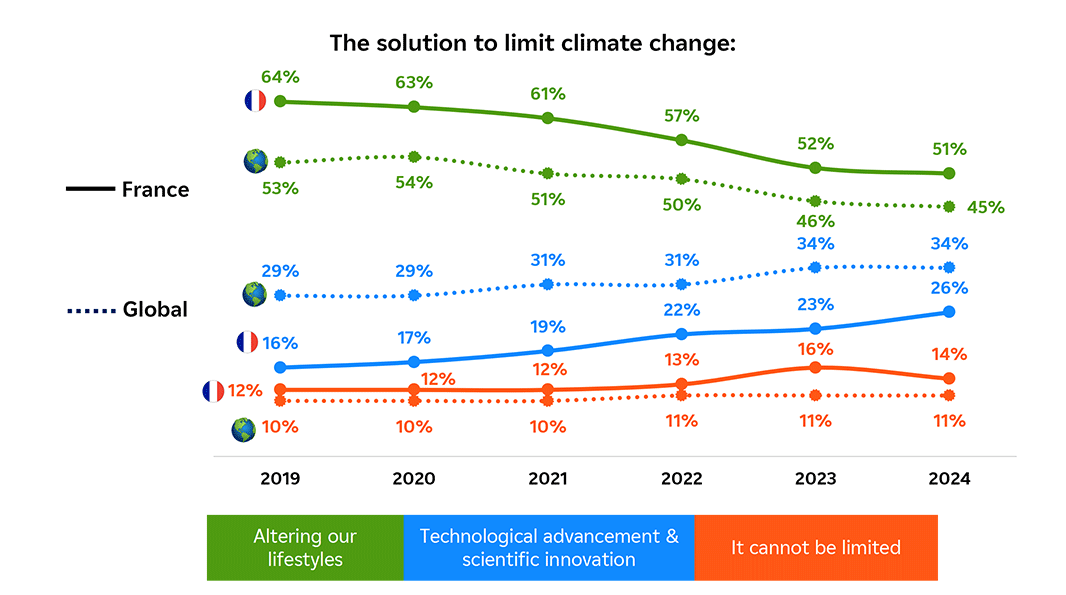
Transcript
The solution to limit climate change
Altering our lifestyles:
France:
- 2019: 64%
- 2020: 63%
- 2021: 61%
- 2022: 57%
- 2023: 52%
- 2024: 51%
Global:
- 2019: 53%
- 2020: 54%
- 2021: 51%
- 2022: 50%
- 2023: 46%
- 2024: 45%
Technological advancement & scientific innovation:
France:
- 2019: 16%
- 2020: 17%
- 2021: 19%
- 2022: 22%
- 2023: 23%
- 2024: 26%
Global:
- 2019: 29%
- 2020: 29%
- 2021: 31%
- 2022: 31%
- 2023: 34%
- 2024: 34%
It cannot be limited:
France:
- 2019: 12%
- 2020: 12%
- 2021: 12%
- 2022: 13%
- 2023: 16%
- 2024: 14%
Global:
- 2019: 10%
- 2020: 10%
- 2021: 10%
- 2022: 11%
- 2023: 11%
- 2024: 11%
France does not escape this global trend, although its inhabitants continue to choose the “lifestyle” option with a – small – majority of 51%, compared to 26% for the technological option. But these figures are evolving: the lifestyle lever has dropped 13 points in 6 years, whereas the techno-solutionist option has progressed 10 points. So the French are gradually aligning with the rest of the world’s population in being less and less supportive of a demand doubtless viewed as unfair and guilt-inducing.
The ineffectiveness of this demand is evident in the fact that the efforts made by the French on a day-to-day basis have dropped in the past two years in almost all areas, especially as concerns car use (31% systematically avoid it or almost whenever possible, -6 points) or air travel (32% systematically avoid it or almost whenever possible, -4 points). However, the French are still among the top of the class in the 30 countries surveyed, with more frequent habits in terms of energy sobriety in particular.
When it comes to the government policies that could be adopted to reduce greenhouse gas emissions, the French continue to massively reject any policies that would involve new taxes further restricting their purchasing power, particularly as concerns their vehicles:
- Only 26% would view setting up urban tollbooths at the entrance to large cities as acceptable (=) ;
- 32% when it comes to making CO₂-producing energies such as gas and gasoline more expensive (+3).
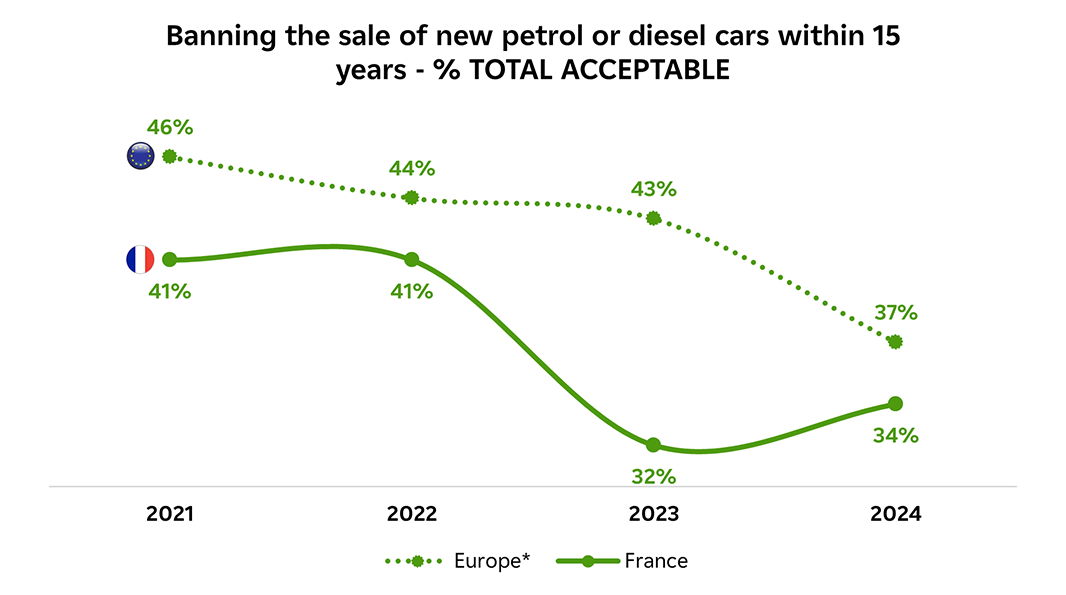
Transcript
Banning the sale of new petrol or diesel cars within 15 years
% TOTAL ACCEPTABLE
France:
- 2021: 41%
- 2022: 41%
- 2023: 32%
- 2024: 34%
Europe:
- 2021: 46%
- 2022: 44%
- 2023: 43%
- 2024: 37%
A particular point to be noted in relation to the future of gas-powered cars: a ban on their sale by 2035 is deemed less and less acceptable in France (34% acceptability, -7 points in 4 years), and this also applies in all European countries (European average 37%, -9 points).
* NB: the Czech Republic was added to the European scope this year, which partially explains the strong evolution in the Europe Total between 2023 and 2024.

